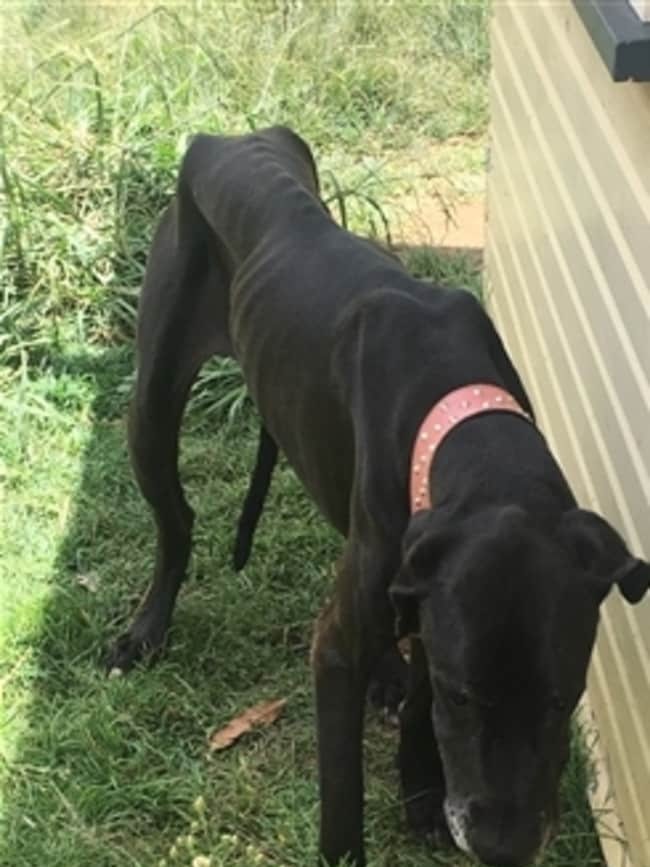Kylie Lang: Animal abusers belong in prison
When perpetrators of cruelty to pets often reoffend and commit other crimes such as breaching domestic violence orders, they need a harsh handbrake. It’s called jail, writes Kylie Lang. GRAPHIC CONTENT
Opinion
Don't miss out on the headlines from Opinion. Followed categories will be added to My News.
BANNING animal abusers from owning pets for a few years is pointless.
When more than one-third of these grubs reoffend, the courts should not tread gently.
Permanently deny them the privilege it is to have a pet and, in severe cases of cruelty, lock them up.
The law allows for this, yet the law is rarely applied with any meaningful force.
Take three cases to make headlines this week – three of too many this year, and every year before that.
A Logan man let an American Staffordshire bull terrier die of heatstroke after it was chained to a clothes line without shade or water on a 35C day.

The distressed creature, Bronx, had tried to chew through the 5kg chain and hadn’t been fed up for to 48 hours.
Kristopher Torpy, 29, was convicted of two offences under Queensland’s Animal Care and Protection Act.
Magistrate Louise Shephard said Torpy had been “grossly negligent” with “catastrophic” consequences, then banned him from animal ownership for a grand total of four years.
A 24-year-old Caboolture man whose negligence nearly killed a Great Dane got a three-year ban by the same magistrate.


In the four months Luke William Yeardye was meant to be caring for his parents’ beloved Brighid, the dog went from “fat” to “emaciated”, with muscle wastage in her hind legs.
Yeardye told his parents Brighid had died of a snake bite when she’d actually been seized by the RSPCA “just in the nick of time”, according to Ms Shephard.
A puppy, confined to squalid conditions indoors, was also confiscated.
The court heard Yeardye didn’t contact the RSPCA to have the dogs returned because he feared the consequences of his actions.
He needn’t have worried.
A ban and $3000 in fines were all he copped. No convictions were recorded.
And what of the consequences for a Deception Bay couple who severely mistreated an elderly Alaskan Malamute? A two-year ban, 80 hours’ community service and again, no recording of convictions.

If police hadn’t been searching Damien O’mara and Melissa Kaye Grant’s home on a different matter, who knows what might have happened to 13-year-old Ella. She was so skinny the bones in her skull were showing.
Magistrate Peter Hasted didn’t accept the couple’s claim the dog was a “fussy eater”. Who would?
Seriously, is this the best our legal system can do?
Banning people from owning animals is ill-fitting punishment when it seems clear they don’t want them in the first place.
And no-one is able to tell me how bans are enforced.
The recent Queensland Sentencing Advisory Council report into animal welfare offences is damning.
Take your pick of any number of alarming findings and you’ll see the system is hopeless.
Thirty-five per cent of offenders go on to reoffend.
Only 9.2 per cent spend time behind bars (for an average of five months).
A whopping 84 per cent of cases are of “serious animal cruelty” yet just 1.5 per cent are sentenced in the District Court, under section 242 of the Criminal Code (Qld) which carries a maximum jail time of seven years.
Almost every single case is heard in the Magistrates Court, under the Animal Care and Protection Act which limits prison time to three years.
Why the reluctance to prosecute under the Criminal Code?
Why the leniency on incarceration, full stop?
When QSAC chair John Robertson, a former District Court judge himself, says the number of cases has more than doubled since 2014, it is clear that whatever is being done to fix a growing problem is not working.

Keep in mind too, as stated in the report, two-thirds of animal abusers are male and many commit other offences, including breaching domestic violence orders (neither of which are alleged of anyone in this column).
Relying on ownership bans will not protect animals any more than DVOs as meaningless slips of paper protect women and children.
Slaps on the wrist do not modify bad behaviour. They allow it to fester.
Menaces to society must be held properly accountable for their actions and given time to consider the consequences of their cruelty.
Jail is the perfect place.
